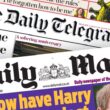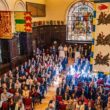Quick read. The German-owned Immediate Media, of the UK, has acquired the BBC Good Food brand including the magazine, digital and live events businesses, with which it has had an agency relationship since much of the company’s portfolio was originally spun-out of the BBC in 2011.
Immediate claims the deal makes it the “largest food media publisher in the UK”, which sits well with its less trumpeted accolade of being the UK’s most profitable magazine publisher. BBC Good Food is the UK’s largest food website with 22m global monthly visitors, and the best-selling food magazine, with 1.3m monthly readers and an average print circulation of 160k.
BBC Good Food brings with it strong but under-profitable events including the: BBC Good Food Show and regular roadshows with the UK’s top chefs, tastings, shopping and entertainment. These events are claimed to attract 300,000 visitors who reportedly spend £27m at the shows. The out-sourced organiser River Street Events (whose owner formerly managed the events at the BBC’s erstwhile events partner Haymarket Media) is bracing herself for a re-negotiation with (or job offer from) the new owner.
BBC Good Food also has a popular Amazon Alexa recipe skill which will enhance Immediate’s opportunities in burgeoning audio media. It is believed that the BBC Good Food portfolio has total revenue of almost £25m – doubled in the past five years – with digital revenue now having overtaken print. Although financial terms have not been disclosed, it is believed the acquisition price was some £30m. It is believed that Immediate plans now to extend the brand’s live events and there is some talk that it will seek to buy the independently-owned and impressive (but only marginally profitable) Great British Chefs.
This latest UK deal highlights the success of Hubert Burda Media, which acquired Immediate Media from Exponent private equity for £260m in 2017. In its last financial report, it said that the Immediate acquisition had almost doubled the Burda’s international business which accounted for €455m (18% of all Burda revenue) and made the UK its largest market outside Germany. Immediate publishes the broadcast listings weekly Radio Times, Cycling Plus, MountainBike UK, Triathlon, Cross Stitcher Gold, Olive, Lonely Planet Traveller, and BBC titles such as Top Gear, Gardeners’ World, and CBeebies. It also has a growing slate of live events.
Immediate’s success in achieving best-in-class profit growth over the past five years has – whisper it softly – been largely achieved through steep cover price increases on the extraordinarily resilient Radio Times. But the company has also generally achieved above-average magazine copy sales and invested smartly in digital e-commerce platforms in the wedding, jewellery, and craft sectors, and in events.
The under-stated CEO Tom Bureau has been a starring act in a pretty cloudy world. It’s not the kind of performance we have come to expect from the beleagured magazine market. But, then, that goes also for the German parent company.
In 110 years, the family-owned Burda has grown into one of Europe’s largest and steadiest publishing groups. Its real rise to prominence began in 1949 with the launch of Burda Moden, now called Burda Style, a German magazine containing sewing patterns for housewives in post-War Germany.
Burda now has one of the world’s largest databases of digital sewing patterns. Across more than 20 countries, the €2.7bn-revenue company publishes more than 300 magazines, including Focus, the German news weekly, celebrity magazine Bunte, and local editions of Elle, InStyle and Playboy.
Hubert Burda ran the company himself for 30 years until 2010, when he handed over day-to-day control to former McKinsey consultant Paul-Bernhard Kallen. His company is, more than ever, the magazine publisher that is admired (and envied) by magazine people everywhere. Dead cool.



